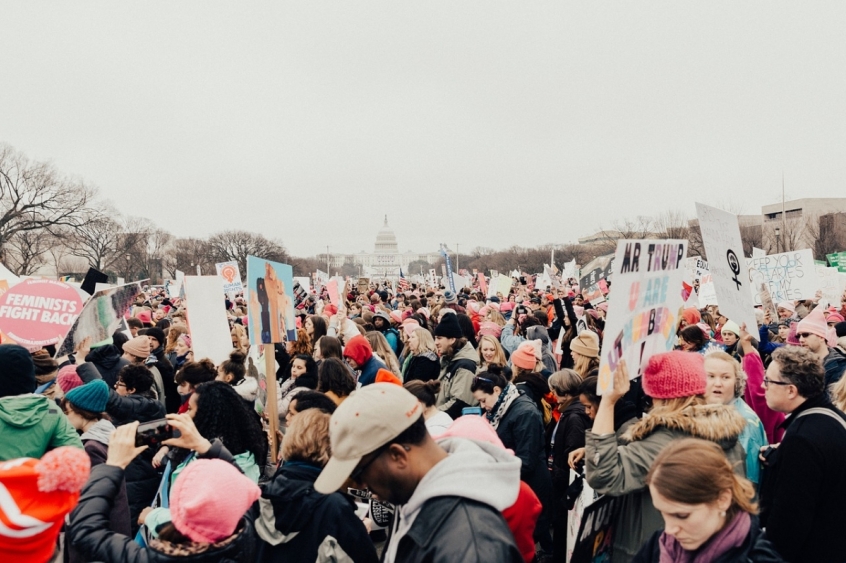Today is International Women's Day, a powerful prompt for global advocacy against sexism and gender inequality. In case it wasn't obvious, this is a day that men should mark and celebrate too, especially followers of Jesus.
A man defending International Women's Day might present as patronising, another case of 'mansplaining' perhaps. And isn't it obvious? Of course women are equal, it's the 21<sup>st century. But would it be right for men to say nothing on a day such as this, especially in an age in which gender inequality remains rife across the world?
Whether it's domestic violence, sexual harassment in the workplace or vast gender pay gaps, gross inequalities persist even in the supposedly enlightened, democratic West. The church of course, is no exception. Whatever theological views one may take on church leadership or family roles, it can't be contested that Christian history has been dominated by the male voice and will, frequently at the expense of women.

Something's wrong, and today reminds us of the need to help put it right. Here are three reasons men should wholeheartedly celebrate it and seek to combat the injustice it illuminates.
1. Because the Bible tells you so
Scripture makes radical claims about the status of women as God's beloved, dignified creation. The word 'helper' (used for Eve in Genesis 2:18) is sometimes cited as a classic example of the weak passivity envisaged for women in a man's world, but the Hebrew word is later used (prolifically in the Psalms) to describe the saving action of God for humanity – hardly submissive insignificance, more like saving grace.
The Old Testament raises up women for numerous instrumental roles, whether it's faithful Ruth, cunning Rahab, bold Queen Esther or the mighty prophetess Deborah, to name just a few. Even when women do suffer the oppression familiar to so many throughout history, their suffering is recognised by God. In a startling account, Hagar declares of the Lord: 'You are the God who sees me...I have now seen the One who sees me' (Genesis 16:13).
Then we have the dignity Christ offered to the silenced and side-lined women of his day, and Paul's famous but revolutionary statement that 'There is neither Jew nor Gentile, neither slave nor free, nor is there male and female, for you are all one in Christ Jesus.' (Galatians 3:28) The Bible takes the equality of women, and the celebration of their profound worth, very seriously. It may be hard or even painful to decipher at times, but its thrust is clear: reversing the gender-oppression and subjection that followed humanity's fall, not encouraging it.
2. Inequality is unjust – and men are part of the problem
Subsequently, all Christians should take this kind of social justice with the utmost seriousness. Consider the silent epidemic of domestic violence, faced by as many as one in four women in their lifetime. Ill-intended injury from one human being to another is unacceptable, but in the context of the home, supposedly a haven of trust, love and protection, it is evil – and yet also frequently invisible to us. That means speaking about the injustice, and crucially, enabling women to speak about it, is essential for those who believe in the free flourishing of all human beings.
Men need to care about this not just because it's wrong but because they are complicit in it. Oppression of women generally means the elevation of men – but men don't have to accept that's how things must be. They can and should publicly praise and promote women yes, but also need to take the harder path of soberly admitting their wrongdoing. It shouldn't take vast levels of self-awareness for a man to recognise the extent to which society is geared to his success, and to the subjection – even in the smallest ways – of women. Men possess power: they can wield it for selfish profit, or surrender it for the good of others.
3. Equality is good for everyone
A day such as this can be celebrated because its not about some nefarious 'man-hating' agenda but is directed toward justice – and justice is good for everyone. Christians believe that God purposefully created men and women, both in his image. This difference is to be celebrated, not seen as a pretext for oppression, a 'biblical' explanation of why women should be silenced or ignored. When that happens, it should be a cause for weeping, a death that diminishes us all, to paraphrase John Donne. The reverse – equality and mutual flourishing – is to be praised.
Growing up in a single-parent home, I've been privileged to live in a family setting where the women outnumber the men, and it's been a profound gift, a source of life, joy and love I don't believe I could've known elsewhere.
Men have 'held the mic' for most of human history, and in political terms it's only the past century that's really seen a successful rebellion against that hegemony. 'Feminism', it seems to me, is about the bold notion that combatting the male-preferencing patterns of society may actually take concerted effort, but that equality – its ultimate goal – is a worthy effort for us all. Feminism isn't a dirty word. Equality is only a threat for those afraid to lose their power.
You can follow @JosephHartropp on Twitter













